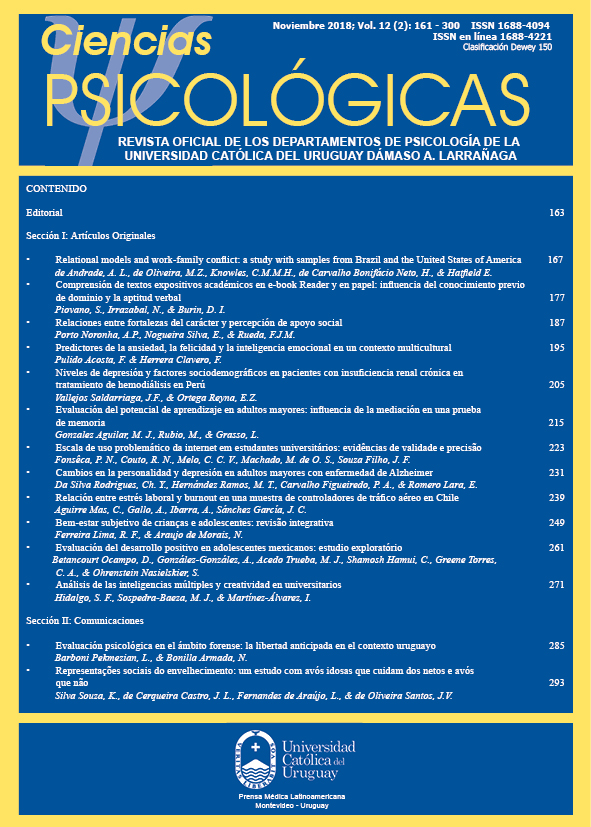Relationships between character strengths and perception of social support
DOI:
https://doi.org/10.22235/cp.v12i2.1681Keywords:
positive psychology, psychological assessment, social support, strengths, adolescenceAbstract
This study aimed to study the relations between character and social support, through the Characters Strengths Scale (EFC) and Social Support Scale - EPSUS-IJ (Youth version). 293 adolescents, 14 to 17 years (M=14.95, SD= 3.038) participated, 67.8% female. Results showed that the factor 1 (Contributing to Problems) EPSUS-IJ contributed significantly to explain 21 characters strengths. The second factor (Social Interaction) presented significant coefficients in 14 strengths, and factor 3 (Affectivity) in 12 strengths. The findings are discussed based on literature.
Downloads
References
Baptista, M. N., & Cardoso, H. F. (2013). Escala de Percepção do Suporte Social (Versão Infanto-Juvenil): relatório técnico não publicado. Universidade São Francisco: Itatiba.
Bastianello, M. R., & Hutz, C. S. (2016). Otimismo e suporte social em mulheres com câncer de mama: uma revisão sistemática. Psicologia: teoria e prática, 18(2), 19-33. doi: 10.15348/1980-6906/PSICOLOGIA.V18N2P19-33.
Campos, E. P. (2004). Suporte Social e Família. En: J. Mello Filho (Org.), Doença e família (pp. 141-161). São Paulo: Casa do Psicólogo.
Cobb, S. (1976). Social support as a moderator of life stress. Psychosomatic Medicine, 38(5), 300-314. doi: 10.1097/00006842-197609000-00003.
De Jong Gieverld, J., & Dykstra, P. A. (2008). Virtue is its own reward? Support-giving in the family and loneliness in middle and old age. Ageing and Society, 28(2), 271-287. doi: 10.1017/S0144686X07006629.
Hair, J. F., Tatham, R. L., & Black, C., (2005). Análise Multivariada de Dados. Porto Alegre: Bookman.
McGrath, R. E. (2015a). Measurement Invariance in Translations of the VIA Inventory
of Strengths. European Journal of Psychological Assessment, 1, 1-8. doi: 10.1027/1015-5759/a000248.
McGrath, R. E. (2015b). Integrating psychological and cultural perspectives on virtue: The hierarchical structure of character strengths. The Journal of Positive Psychology, 10(5), 407-424. doi: 10.1080/17439760.2014.994222.
Noronha, A. P. P., & Barbosa, A. J. G. (2016). Escala de Forças e Virtudes. En C. Hutz (Org.), Avaliação em Psicologia Positiva (pp. 42-53). São Paulo: Hogrefe.
Noronha, A. P. P., Dellazzana-Zanon, L. L., & Zanon C. (2015). Internal Structure of the Strengths and Virtues Scale in Brazil. Psico-USF, 20(2), 229-235. doi: 10.1590/1413-82712015200204.
Noronha, A. P. P., & Martins, D. F. (2016). Associações entre forças de caráter e satisfação com a vida: estudo com universitários. Acta Colombiana de Psicologia, 19(2), 83-89.
Nurullah, A. S. (2012). Received and provided social support: a review of current evidence and future directions. American Journal of Health Studies, 27(3), 173-188.
Oliveira, C., Nunes, M. F. O., Legal., E., & Noronha, A. P. P. (2016). Subjective Well-Being: Linear Relationships to Character Strengths. Avaliação Psicológica, 15(3), 177-185.
Peterson, C., & Seligman, M. E.P. (2004). Character Strengths and Virtues: A Handbook and Classification. Washington, DC: American Psychological Association.
Procidano, M. E., & Heller, K. (1983). Measures of perceived social support from friends and from family: Three validation studies. American Journal of Community Psychology, 11(1), 1-24. doi: 10.1007/BF00898416.
Proyer, R. T., Gander, F., Wellenzohn, S., & Ruch, W. (2015). Strengths-based positive psychology interventions: A randomized placebo-controlled online trial on long-term effects for a signature strengths- vs. a lesser strengths-intervention. Frontiers in Psychology, 9(456), 1-14. doi: 10.3389/fpsyg.2015.00456.
Renshaw, T., & Steeves, R. M. O. (2016). What good is gratitude in youth and schools? A systematic review and meta-analysis of correlates and intervention outcomes. Psychology in the Schools, 53(3), 286-305. doi: 10.1002/pits.21903.
Rodriguez, M., & Cohen, S. (1998). Social support. En: H. Friedman (Org.), Encyclopedia of Mental Health (pp. 535-544). New York: Academic Press.
Ruch, W., Martínez-Martí, M. L., Proyer, R. T., & Harzen, C. (2014). The Characters Strengths Rating Form (CSRF): Development and initial assessment of a 24-item rating scale to assess character strengths. Personality and Individual Differences, 68, 53-58.
Ruch, W., Weber, M., Park, N., & Peterson, C. (2014). Character strengths in children and adolescents: Reliability and initial validity of the German Values in Action Inventory of Strengths for Youth (German VIA-Youth). European Journal of Psychological Assessment, 30(1), 57-64. doi: 10.1027/1015-5759/a000169.
Seibel, B. L., DeSouza, D., & Koller, S. H. (2015). Adaptação Brasileira e Estrutura Fatorial da Escala 240-item VIA Inventory of Strengths. Psico-USF, 20(3), 371-383. doi: 10.1590/1413-82712015200301.
Shoshani, A., & Slone, M. (2013). Middle School Transition from the Strengths Perspective: Young adolescents´ Character Strengths, Subjective Well-Being and School Adjustment. Journal of Happiness Studies, 14(4), 1163-1181. doi: 10.1007/s10902-012-9374-y.
Snyder, S. J., & Lopez, C. R. (2009). Psicologia Positiva: uma abordagem científica e prática das qualidades humanas. Porto Alegre: Artmed.
Thoits, P. A. (1982). Conceptual, methodological and theoretical problems in studying social support as a buffer against life stress. Journal of Health and Social Behavior, 23(2), 145-159.
Thompson, E. A., Mazza, J. J., Herting, J. R., Randell, P. B., & Eggert, L. L. (2005). The mediating roles of anxiety, depression, and hopelessness on adolescent suicidal behaviors. Suicide Life Threat Behavior, 35(1), 14-34. doi: 10.1521/suli.35.1.14.59266.
Toner, E., Haslam, N., Robinson, J., & Williams, P. (2012). Character strengths and wellbeing in adolescence: Structure and correlates of the Values in Action Inventory of Strengths for Children. Personality and Individual Differences, 52, 637-642. doi: 10.1016/j.paid.2011.12.014.
Urbina, S. (2007). Fundamentos da testagem psicológica. Porto Alegre: Artmed.
Wagner, L., & Ruch, W. (2015). Good character at school: Positive classroom behavior mediates the link between character strengths and school achievement. Frontiers in Psychology, 6(610), 1-13. doi: 10.3389/fpsyg.2015.00610.
Weber, W., & Ruch, W. (2012). The role of a good character in 12-year-old school children: Do character strengths matter in the classroom? Child Indicators Research, 5, 317-334. doi: 10.1007/s12187-011-9128-0.
















